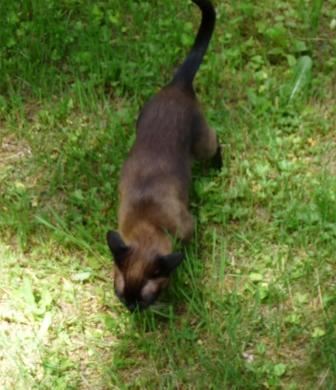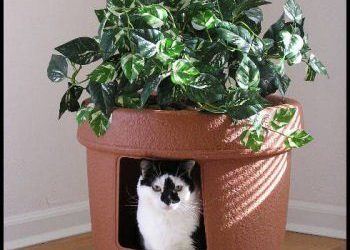Jungle kitty, Melissa, at home on the lawn, having a grass snack.
That wasn’t the answer I was expecting, but, of course, that’s why Animal Communication is so important. It definitely helps us understand the animal’s perspective.
Melissa is now almost 4 and half years old, and is quite a fierce hunter. She has captured and sometimes killed mice, chipmunks, garter snakes, dragonflies, moles, various other insects, and once a red squirrel.
Inside the house, she is controlling the mouse population. There are nights when she doesn’t come to bed until 3 a.m. or later. She’s been “on patrol.”
During the day, she gets to go outside for awhile. This is to save me having to replace screens on a regular basis, and also because she’s miserable and frantic when confined indoors.
When she was younger, Melissa would bring in her prey alive. This was to show them off to me and to play with them. When they got loose … the game was on.
I would try to keep her from bringing in her catches, so Melissa became like Demosthenes, the Greek who had trouble speaking clearly and used pebbles in his mouth to improve his speech.
At first when she came to the door with a catch, I could tell by the sounds she made that her mouth was full of something. This was true the first 2 times.
By the third time, I could no longer discern that Melissa had anything in her mouth.
Eventually, Melissa would bring home a catch that was already dead, and after playing with it a bit while I praised her hunting skills, she would let me take it and put it outside. Once I did that, she’d ignore it. I’d then take the body and place it where some other animal might benefit from her kill.
But eventually, Melissa just couldn’t resist eating her catches, despite my efforts to make sure she went outside on a full or nearly full stomach.
And the consequence of that is … PARASITES.
All wild animals (birds and mammals) that a cat will eat have parasites. And by eating the animal, the cat gets infected.
It became clear to me in the last 2 weeks that Melissa has worms and needs to be dewormed.
There were 3 main symptoms:
-
- greater than normal hunger;
- constipation; and
- a coughing that occurs when the larvae, which have been maturing in the lungs, are ready to move back into the digestive system.
So today I got some dewormer from my veterinarian for Melissa, and some syringes I can use to give her the meds as a paste if I can’t get her to eat it in her food..
The thing is, Melissa has a very sensitive nose. And this dewormer is supposed to go into the cat’s food. Would I get away with this approach?
Melissa’s sense of smell is very powerful. She won’t eat food that’s the slightest bit older in one bowl than in the other bowl.
I will serve food left over from the previous day, but still good to eat – according to my nose and Starlight’s nose, but Melissa won’t touch it and always chooses the newer food in the other bowl.
Remember, my cats get a raw food diet. The food is not left out for hours and hours. They get it at feeding time and within 2 hours, they’ve eaten. I put any left-over away. It’s still perfectly good to eat – unless you have Melissa’s nose telling you otherwise.
So could I give her deworming medicine in her food? Could I really get away with this?
Hence, our conversation:
Nedda: “Melissa, what’s your favorite food?”
Melissa: “Mouse.” [This is said without hesitation or consideration, and very matter-of-factly.]
Nedda: [Laughing very hard at herself for not asking the question correctly.]
Nedda: “Melissa, of the foods I feed you, do you have a favorite?”
Melissa: “Not really.”
Nedda: “How do you feel about fish? Like salmon? Or sardines.”
Melissa: “They’re OK.”
Well, I’m not about to serve mouse to Melissa.
Melissa needs 3 doses of medication over 3 days . Today, Day 1, she ate it in some of the raw chicken mix covered with a small amount of sardines.
I tried serving it without the sardines, but after one taste, Melissa walked away. And she had been asking for food, so she was hungry.
So far, so good.
Will I get away with this tomorrow and the next day?
Stay tuned for the update.
A few more things I have to keep in mind.
- Melissa will not stop hunting, so she’s going to have to go onto a regular deworming schedule.
- Starlight may or may not catch the worms from Melissa.
Oh, dear. I shall have to give up feeding the birds this winter to keep Melissa from attacking them. She can easily leap straight up about 4 and a half feet and knock a bird out of the air. I’ve seen her do it!
I’m going to miss the birds … and they’re going to miss this feeding station.
Sigh!
That’s life with a Jungle Kitty!








Nedda I enjoyed your story I go through the same with George I know he eats what he catches but I am not aware of him having paracites
Hi, Tom,
I’ve heard that cats can become “immune” to parasites, i.e., have them but not be damaged by them. I don’t know if this is true, but I’ve also heard that when that is the case, they show no symptoms.
Having a stool sample tested is no guaranty, either. Melissa’s test showed nothing, yet the behavioral changes are definitely due to worms.
I always enjoy your blogs and also have a teeny Siamese. There are homeopathic nosodes for parasites that you can administer on a monthly basis in her water bowl as well as protecting the other kitties in the house. Earth Song Ranch makes as does Homeopet. It may be worthwhile researching. Dawn
Hi, Dawn,
Nosodes are great. Unfortunately, Melissa won’t drink water. Her diet is raw food with lots of water mixed into the veggie portion, so she’s OK most of the time. Despite a water bowl changed daily, she won’t touch it. One hot day this summer, she was licking the little bit of water from the bathroom sink. So now I keep a small glass dish there that she’ll drink a teeny bit out of on rare occasions. I don’t think nosodes in the water are an option for her. 🙁